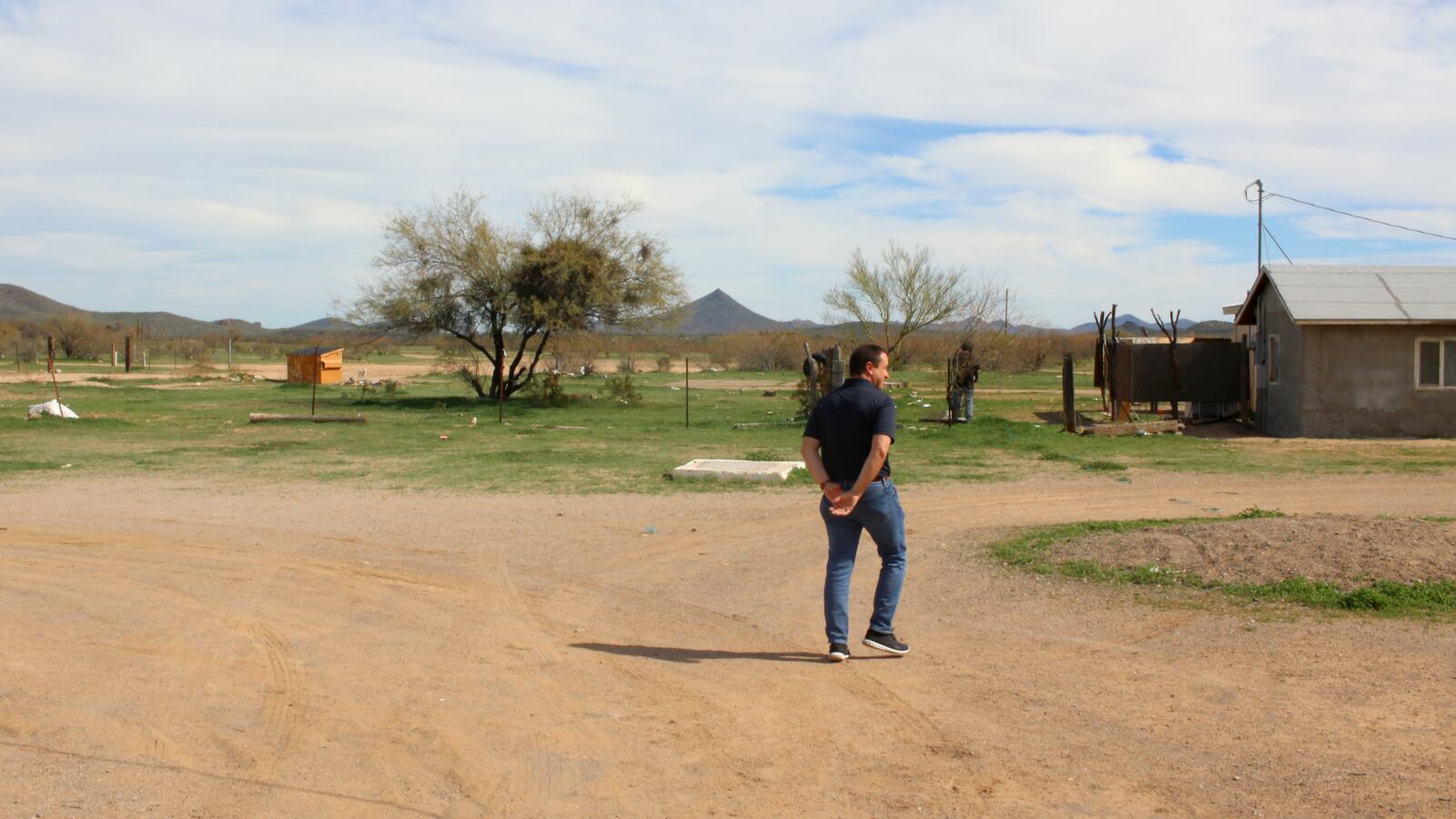Votebeat is a nonprofit news organization reporting on voting access and election administration across the U.S. Sign up for our free newsletters here.
GHAKA, Ariz. — The dirt roads of this tiny village are quiet on a recent Saturday morning, except for a few roaming dogs. Then, a caravan of trucks carrying county workers drives in.
They’re here a few weeks later than planned. Flooding from a storm made the dirt road into the village impassable for a while, and they had to wait for it to dry out.
They park near the one-room community center and begin unloading equipment on the ground outside: computers and two black utility boxes that carry a portable satellite and cell tower. Once assembled and powered up, the machines generate a hum that carries across the open landscape.
If the technology works as it should, it will give the 44 registered voters of Ghaka — a village in the Tohono O’odham Nation 100 miles from the nearest Maricopa County community — an opportunity to vote in the same convenient and secure manner as the rest of the county.
Now, they just need the red indicator lights on the portable cell tower in one of the black boxes to turn green.
But that doesn’t happen. Getting Ghaka on the grid for voters won’t be so simple.
Providing voting access in rural areas, and especially on tribal land, has long been a challenge in Arizona, and across the country. It’s gotten even more complicated in recent years as counties have adopted new technology that requires a secure and reliable internet or cellular connection. The machines that voters use to cast ballots aren’t connected to the internet, but the electronic pollbooks that allow voters to report an address change on the spot and vote anywhere in the county must be online.
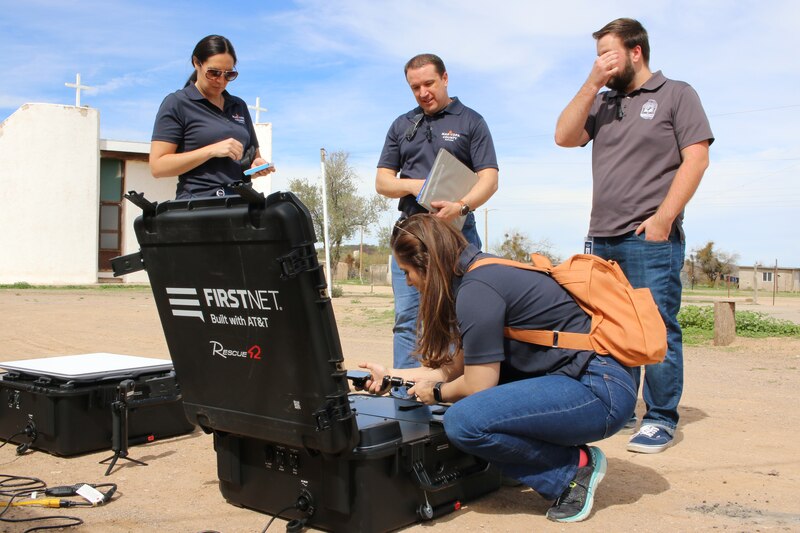
In Ghaka — or Kaka, as the state calls it — there is no internet service, and cellphones work only in a few spots. It is one of the most remote voting locations in the state, and a big test of the county’s efforts to improve access to the ballot in rural areas.
The village is located at the very southern tip of Maricopa County, in the middle of the 4,000-square-mile reservation, amid fields of saguaros, rolling hills, and plains. It consists of two dozen or so homes, a community center, and a church.
Voters who turn out in person at the community center usually must cast a provisional ballot, because electronic pollbooks can’t be used there to check the most up-to-date registration and voting records. Provisional ballots are usually counted eventually, but need to be reviewed first, an extra step.
To get to another county voting location, Ghaka residents would have to drive two hours north, to Gila Bend, or through Pinal County to Chandler.
Mail voting hasn’t been reliable here. There’s a group mailbox near the community center, but ballots sent there have often been returned to the county, marked as undeliverable. County officials have been working on trying to fix that.
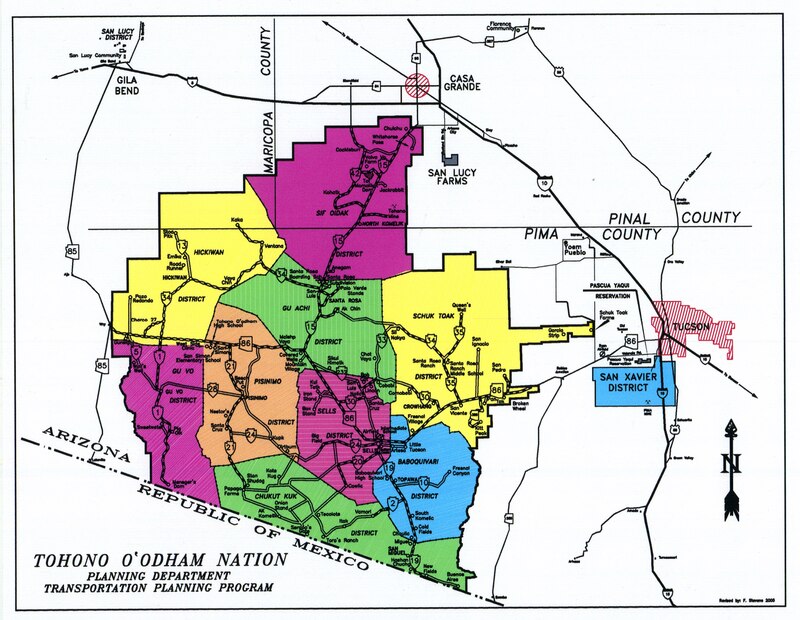
It takes the county election officials more than two hours to make the drive to the village. The cellular and satellite technology they are testing to try to develop a secure internet hotspot in the village cost $35,000 — all for the sake of 44 registered voters.
Is it really worth the time and cost?
“Absolutely,” said Elections Director Scott Jarrett, listing the numerous challenges Ghaka residents have faced voting in person and by mail. If the setup works, he added later, it could be replicated elsewhere. But county governments would have to find a way to pay for it.
The technology Maricopa County is testing in Ghaka was purchased with federal money. It allows for the same type of secure hotspot connection the county uses at all other voting locations, a good thing when you’re transferring sensitive voter data.
The state is testing satellite devices in other areas, too, though not the portable cellular towers.
For Tuesday’s presidential preference election, the Arizona Secretary of State’s Office is partnering with Starlink to provide satellites to three counties for use in areas without reliable internet service.
Three of the satellites will be in Navajo County, including two on reservation land. Elections Director Rayleen Richards said she is looking forward to seeing how it goes.
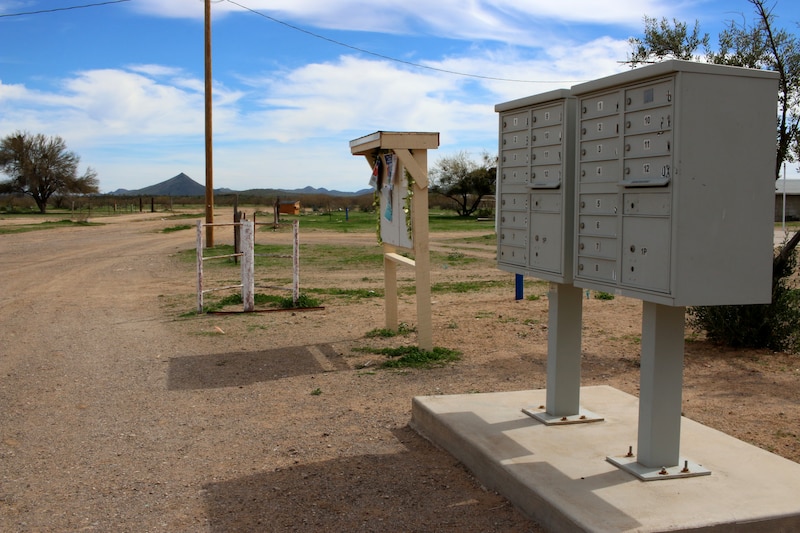
Giving Ghaka a secure vote
Around 15 minutes after unloading in Ghaka, Alex Osgood, a member of the technical staff for the county recorder, calls Jarrett over to the black boxes to give him an update.
“Right now we already have the Starlink up and running,” he says, talking about the worldwide satellite-based internet service that’s been used for secure communications by Ukrainian forces, among others. “We are just waiting for the actual cell portion of it to kick online. It usually takes 10 to 15 minutes.”
Inside the community center, communications and voter registration staff set up computers, a ballot printer, and an accessible voting device. The 11 staffers are here not just to test the technology but also to educate voters on how to vote — and to recruit a few members of the community as poll workers for the upcoming elections. They have a presentation prepared for a community meeting.
As the county workers get set up, Alvin Manuel, a community leader and council member representing the Nation’s Hickiwan District, walks over to introduce himself. He isn’t the person the county officials were supposed to meet with, but something important has come up: There was a wake in the morning for a community member. Manuel is here to make sure county officials were still able to get into the building.
This is a small village, even compared with others on the Tohono O’odham Nation. It’s more than an hour from the capital, Sells, and the rural district it is located in has just 817 of the roughly 13,000 people estimated to live on the reservation.
The community has about 130 people, who communicate mainly in person. To get cell service, Manuel says you can go “up the hill.” When Jarrett asks who in the community might come to the voter presentation, Manuel looks around at the houses in the distance, their doors closed. He doesn’t seem to know.
At 1 p.m., Jarrett walks down the road to meet two boys pushing their grandfather in a wheelchair, walking toward the meeting and slowly navigating the bumps in the road. The boys, not yet voting age, say they don’t want to stay for the presentation, but their grandfather, Gabriel Garcia, does.
Two other Ghaka residents show up, and Jarrett starts the meeting. County officials say the last time they held a meeting in Ghaka about voting, in 2022, people filled the room. This time, they figure, the wake may have kept some away.
Jarrett’s first question to the group: What’s the biggest obstacle they face in casting a ballot?
“Getting here,” Garcia tells him.
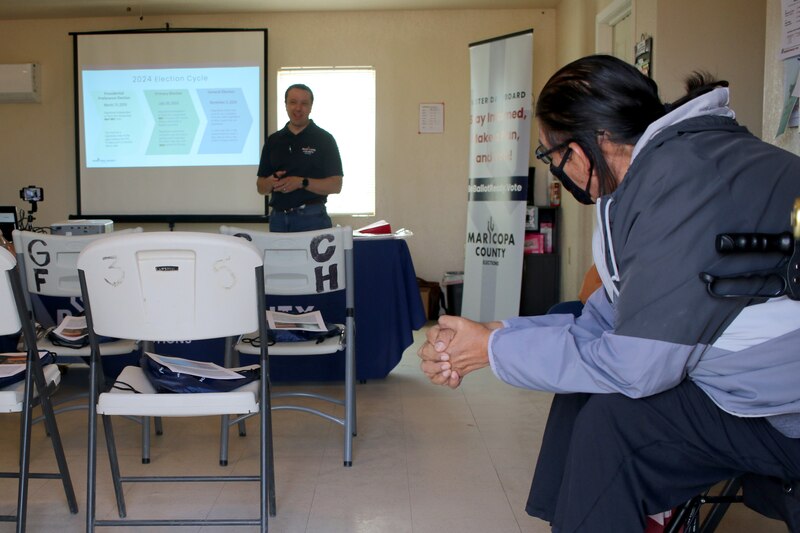
Nine of the 44 registered voters in the community are on the state’s early voting list, which means they should automatically receive a ballot in the mail before each election. But the community has long had a problem getting any outside mail, let alone ballots, partly because it has no street names or addresses, according to Taylor Kinnerup, a spokesperson for the county recorder’s office.
Even the community’s name is complicated. The anglicized version is Kaka, but that’s not how members of the nation spell it. There are various spellings, reflecting the different ways sounds in the traditionally oral O’odham language are transliterated, but Ghaka is one of the most common.
Solving the problem with ballot delivery, Kinnerup said, started with mapping out the area with aerial photography, so that existing mailboxes could be mapped to a physical location on the reservation, she said. Next was working with the U.S. Postal Service to establish the addresses. Kinnerup said she believes the problem has now been solved, and the county hasn’t seen any mail ballots returned as undeliverable for the presidential preference election.
It’s a good example, she said, of how the county tries to make sure that every voter has a reliable way to vote.
But challenges persist. When Jarrett asks the three residents if any of them would be willing to be poll workers during the presidential preference election, no one responds.
Securing connections on reservations
Ghaka’s in-person voters had to start to use provisional ballots in 2020, after Maricopa County switched from paper pollbooks to electronic ones that required internet connections. In November 2022, for the last election the county administered on the reservation, AT&T donated a satellite truck to the county so it could provide a Wi-Fi internet connection, which allowed the pollbook to operate live. But that still didn’t provide the cellular connection needed for the secure hotspot.
Jarrett hopes to get the hotspot working in time for Tuesday’s presidential preference election. Just before he starts the presentation, he checks on the portable cellular device. The two red lights still haven’t turned green. The setup worked fine back in the county’s parking lot, so Jarrett and the technicians are confused about why it’s not working now, in Ghaka, where they need it.
They call the manufacturer, and Oswood tries to talk through the problem with them. It might be that the radio inside the satellite is broken, Oswood says after he gets off the phone.
They pack up for the day in Ghaka without getting the new technology to work.
“I think we will have to retest this stuff to make sure it 100% works,” Jarrett says.
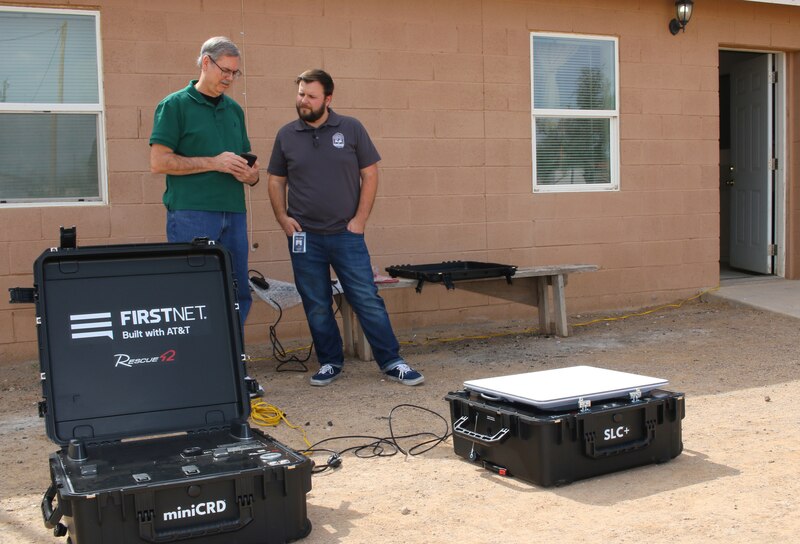
Elsewhere on the Tohono O’odham Nation, which spans three counties, and other reservations, there’s more reliable internet service. Pima County is able to use cellular connectivity at its sites, according to Elections Director Constance Hargrove.
In the northern part of the state, Navajo County works with both the Hopi Tribe and Navajo Nation to set up polling places on the reservations, but only a few polling locations don’t have internet. The Secretary of State’s Office pilot program will allow them to test satellites at these locations.
Richards, the elections director, said the county has been able to use a landline connection at those locations in the past. Satellite would make the connection more secure, Richards said, but “my county is poor. We can’t afford it.”
Navajo County currently spends just $10,000 a year for all of its hotspots.
After the failed test in Ghaka, Maricopa officials find out that one of the communication devices in the satellite box wasn’t working correctly. They get the manufacturer to fix it and they return to test it two weeks later. This time, it works.
The plan is to use the new setup in Ghaka for the first time on Tuesday, during the presidential preference election.
It may not be needed there much longer. Manuel says fiber optic cable was recently installed on the reservation, including all the way out to Ghaka.
But he isn’t sure when it will be up and running.
Jen Fifield is a reporter for Votebeat based in Arizona. Contact Jen at jfifield@votebeat.org.

